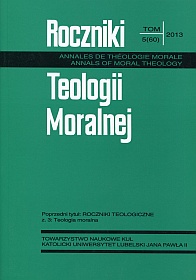Dwie dekady polskich przemian w perspektywie etycznospołecznej
Abstrakt
The round anniversary of the turn of 1989 encourages encourages us to evaluate the past time in various aspects. This study is an attempt to reflect, with a view to moral theology, and inasmuch as it is possible on the two decades of political transformation in the dimension of social life with particular emphasis on the economy. This means that the principal discourse took place on the ethical level, to be precise the socio-ethical level, ignoring the ideological interpretation of the phenomena under study or their interpretation in a political sense.
This publication first and foremost has called to our mind the most important events which a quantum leap in the formation of a new social system. Then some dilemmas have been shown that accompanied the changes. Many of them were related with the fact that a choice of this or that political option of economy was linked with a concrete axiological option. The decades of transformation was dominated mainly by the debate about the shape of social and economic life in Poland, i.e. the choice between a solidary Poland and a liberal Poland. In a further part of the analyses still two more specific criteria of evaluation have been proposed, namely the questions about the place and role of family and human labour in the new reality. A definite family policy and problems of labour focus on the axiological dilemma in question. The questions signaled only in some places should become an object of further detailed and interdisciplinary studies in which an ethical and social view should be present.
Bibliografia
Cuda J.: Praktyczno-społeczne kryterium wiarygodności objawionego sensu historii. Analityczno-syntetyczne studium inspirowane paradygmatem nowej teologii politycznej. Katowice: Księgarnia św. Jacka 1999.
Dudek A.: Reglamentowana Rewolucja. Rozkład dyktatury komunistycznej w Polsce 1988-1990. Kraków: Arcana 2004.
Dylus A.: Między wolnością a sprawiedliwością społeczną. Wartości ekonomiczne i socjalne w katolickiej nauce społecznej. W: Taż. Gospodarka, moralność, chrześcijaństwo. Warszawa: Wydawnictwo Fundacji ATK „Impuls” 1994 s.105-112.
Gabinety koalicyjne w Polsce w latach 1989-1996. Red. M. Chmaj, M. Żmigrodzki. Lublin: Wydawnictwo UMCS 1998 s. 73-93.
Polacy '95. Aktorzy i klienci transformacji. Red. W. Adamski. Warszawa: IFiS PAN 1998.
Polska 1989-1992. Fragmenty pejzażu. Red. M. Grabowska, A. Sułek, Warszawa: IFiS PAN 1993.
Praca kluczem polityki społecznej. Materiały z sympozjum w 25-lecie wydania encykliki Laborem exercens Jana Pawła II. Red. J. Mazur. Lublin: Wydawnictwo KUL 2007.
Skorowski H.: Kościół a polskie problemy okresu transformacji. Warszawa: Wydawnictwo UKSW 2009.
Sytuacja rodzin i polityka rodzinna w Polsce. Uwarunkowania demograficzne i społeczne. IKongres Demograficzny w Polsce. Red. D. Graniewska. Warszawa: RRL, IPiSS 2004.
Świda - Ziemba H.: Mentalność postkomunistyczna. „Kultura i Społeczeństwo” 1994 nr 1 s. 35-50.
Tischner J.: Dokąd prowadzi ta droga? „Tygodnik Powszechny” z dnia 19.11.1989.
Topolski J.: Polska XX wieku 1914-2000. Poznań: Wydawnictwo Poznańskie 20015.
Toso M.: Welfare Society. L'apporto dei pontefici da Leone XIII a Giovanni Paolo II. Roma: LAS 1995.

